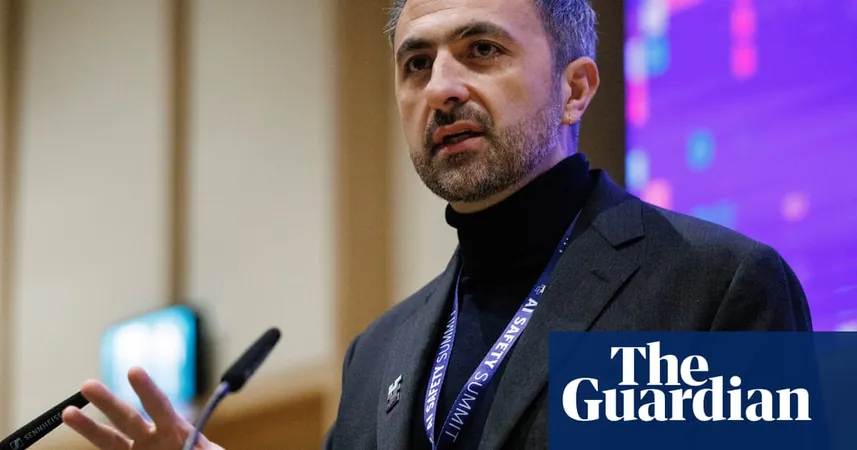
Microsoft’s AI Can Outperform Doctors in Diagnosing Health Issues—A Peek at the Future of Healthcare!
2025-06-30
Author: Jessica Wong
Microsoft has just unveiled a groundbreaking artificial intelligence system that is outperforming human doctors when it comes to diagnosing complex health conditions, paving the way for what they call a "path to medical superintelligence." This revolutionary tech is set to change the landscape of healthcare forever.
The AI unit, led by British tech innovator Mustafa Suleyman, has created a system that mimics a panel of expert physicians tackling intricate and challenging diagnostic cases. During tests, this AI, combined with OpenAI’s advanced o3 model, successfully solved over 80% of specially selected case studies, whereas actual doctors—working without aids such as textbooks or chatbots—achieved only a 20% success rate.
Not only does this AI show promising accuracy, but it also boasts cost-effectiveness by streamlining the process of ordering medical tests. While Microsoft acknowledges potential job implications, the company asserts that AI is intended to complement rather than replace human physicians. They emphasize that doctors play vital roles that go beyond diagnosis, such as establishing patient trust, which AI cannot replicate.
The tantalizing slogan "path to medical superintelligence" suggests a seismic shift in the healthcare market is on the horizon. While artificial general intelligence (AGI) refers to systems matching human cognitive abilities, superintelligence indicates a state where machines could surpass human intellectual capabilities entirely.
Suleyman confidently predicts that this AI could achieve near-error-free operation within the next decade, alleviating some of the burdens on healthcare systems worldwide. He stated, "It’s pretty clear that we are on a path to these systems getting almost error-free in the next 5-10 years." Such advancements could drastically alter patient care.
Yet, Microsoft highlights concerns regarding AI performance on the U.S. Medical Licensing Examination, suggesting that current testing methods may favor rote memorization over genuine understanding. This indicates the complex nature of integrating AI into real-world medical practice.
In a novel approach, Microsoft’s system adopts a step-by-step method akin to real clinicians by asking targeted questions and suggesting diagnostic tests. For example, a cough and fever in a patient could lead to blood tests and a chest X-ray before arriving at a pneumonia diagnosis.
Using intricate case studies from the esteemed New England Journal of Medicine (NEJM), Suleyman's team transformed more than 300 real-world scenarios into interactive case challenges. These were tested using existing AI models from leading tech players such as OpenAI, Meta, Anthropic, Grok, and Google.
The AI operates through a unique system called a "diagnostic orchestrator," simulating a team of physicians to arrive at a diagnosis. In unprecedented tests, this AI system outperformed human doctors dramatically, achieving success in about 80% of the NEJM studies.
Microsoft claims that its AI possesses a "breadth and depth of expertise" that surpasses individual physicians’ capabilities, as it covers multiple medical fields. With AI poised to revolutionize healthcare, patients could gain more control over routine care, while clinicians receive advanced support for intricate cases.
However, it's important to note that Microsoft's research is still in the testing phase and not yet ready for clinical application. Further evaluations are required to ensure its effectiveness across a wider range of common symptoms.




 Brasil (PT)
Brasil (PT)
 Canada (EN)
Canada (EN)
 Chile (ES)
Chile (ES)
 Česko (CS)
Česko (CS)
 대한민국 (KO)
대한민국 (KO)
 España (ES)
España (ES)
 France (FR)
France (FR)
 Hong Kong (EN)
Hong Kong (EN)
 Italia (IT)
Italia (IT)
 日本 (JA)
日本 (JA)
 Magyarország (HU)
Magyarország (HU)
 Norge (NO)
Norge (NO)
 Polska (PL)
Polska (PL)
 Schweiz (DE)
Schweiz (DE)
 Singapore (EN)
Singapore (EN)
 Sverige (SV)
Sverige (SV)
 Suomi (FI)
Suomi (FI)
 Türkiye (TR)
Türkiye (TR)
 الإمارات العربية المتحدة (AR)
الإمارات العربية المتحدة (AR)